Case Study: Ethical and Legal Issues Impacting Nursing Practice
VerifiedAdded on 2021/06/17
|12
|3258
|378
Report
AI Summary
This report analyzes the ethical and legal issues in nursing, focusing on a case study where a nurse breached patient confidentiality by accessing and sharing private health information on social media. The report defines key concepts like privacy, confidentiality, and consent, highlighting the legal framework, including the Australian Privacy Act of 1998 and the Australian Health Practitioner Regulation Agency guidelines. It examines ethical principles such as beneficence, non-maleficence, autonomy, and justice, demonstrating how the nurse's actions violated these principles, leading to potential legal and ethical repercussions. The report emphasizes the importance of maintaining trust, upholding patient rights, and adhering to professional conduct guidelines to prevent harm and ensure the well-being of patients. The report concludes by emphasizing the significance of ethical codes and professional obligations in nursing practice to protect patient privacy and promote responsible use of social media.
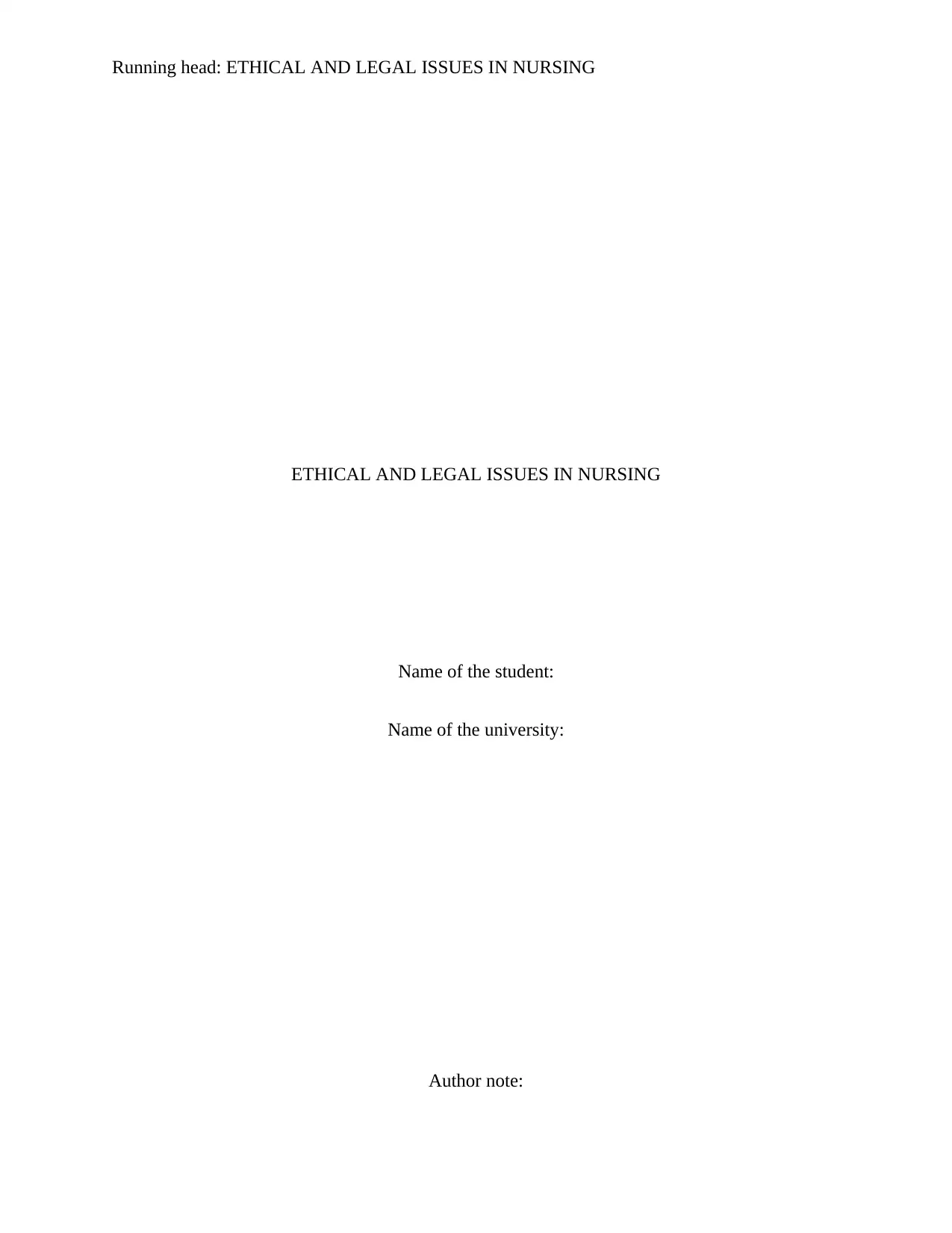
Running head: ETHICAL AND LEGAL ISSUES IN NURSING
ETHICAL AND LEGAL ISSUES IN NURSING
Name of the student:
Name of the university:
Author note:
ETHICAL AND LEGAL ISSUES IN NURSING
Name of the student:
Name of the university:
Author note:
Paraphrase This Document
Need a fresh take? Get an instant paraphrase of this document with our AI Paraphraser
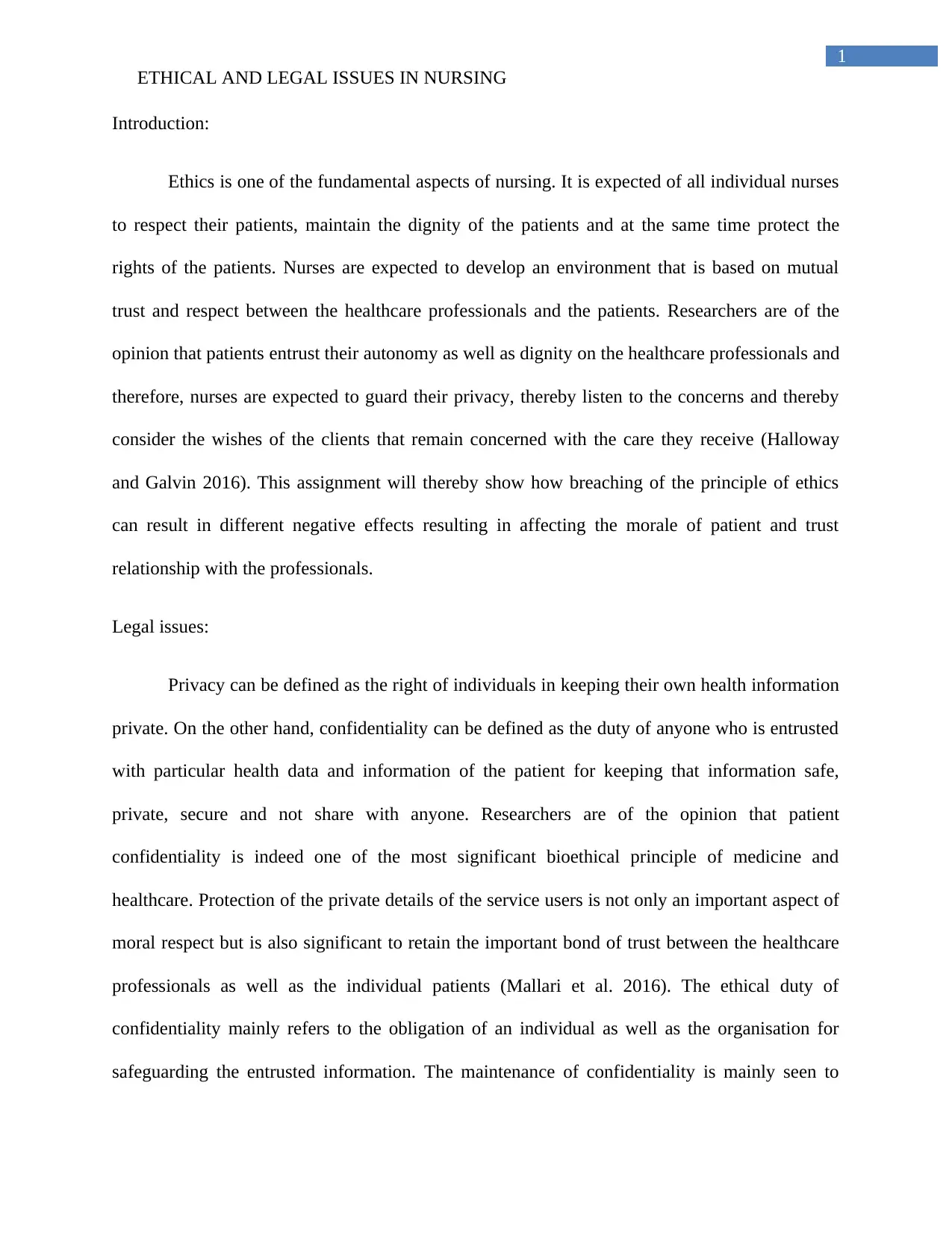
1
ETHICAL AND LEGAL ISSUES IN NURSING
Introduction:
Ethics is one of the fundamental aspects of nursing. It is expected of all individual nurses
to respect their patients, maintain the dignity of the patients and at the same time protect the
rights of the patients. Nurses are expected to develop an environment that is based on mutual
trust and respect between the healthcare professionals and the patients. Researchers are of the
opinion that patients entrust their autonomy as well as dignity on the healthcare professionals and
therefore, nurses are expected to guard their privacy, thereby listen to the concerns and thereby
consider the wishes of the clients that remain concerned with the care they receive (Halloway
and Galvin 2016). This assignment will thereby show how breaching of the principle of ethics
can result in different negative effects resulting in affecting the morale of patient and trust
relationship with the professionals.
Legal issues:
Privacy can be defined as the right of individuals in keeping their own health information
private. On the other hand, confidentiality can be defined as the duty of anyone who is entrusted
with particular health data and information of the patient for keeping that information safe,
private, secure and not share with anyone. Researchers are of the opinion that patient
confidentiality is indeed one of the most significant bioethical principle of medicine and
healthcare. Protection of the private details of the service users is not only an important aspect of
moral respect but is also significant to retain the important bond of trust between the healthcare
professionals as well as the individual patients (Mallari et al. 2016). The ethical duty of
confidentiality mainly refers to the obligation of an individual as well as the organisation for
safeguarding the entrusted information. The maintenance of confidentiality is mainly seen to
ETHICAL AND LEGAL ISSUES IN NURSING
Introduction:
Ethics is one of the fundamental aspects of nursing. It is expected of all individual nurses
to respect their patients, maintain the dignity of the patients and at the same time protect the
rights of the patients. Nurses are expected to develop an environment that is based on mutual
trust and respect between the healthcare professionals and the patients. Researchers are of the
opinion that patients entrust their autonomy as well as dignity on the healthcare professionals and
therefore, nurses are expected to guard their privacy, thereby listen to the concerns and thereby
consider the wishes of the clients that remain concerned with the care they receive (Halloway
and Galvin 2016). This assignment will thereby show how breaching of the principle of ethics
can result in different negative effects resulting in affecting the morale of patient and trust
relationship with the professionals.
Legal issues:
Privacy can be defined as the right of individuals in keeping their own health information
private. On the other hand, confidentiality can be defined as the duty of anyone who is entrusted
with particular health data and information of the patient for keeping that information safe,
private, secure and not share with anyone. Researchers are of the opinion that patient
confidentiality is indeed one of the most significant bioethical principle of medicine and
healthcare. Protection of the private details of the service users is not only an important aspect of
moral respect but is also significant to retain the important bond of trust between the healthcare
professionals as well as the individual patients (Mallari et al. 2016). The ethical duty of
confidentiality mainly refers to the obligation of an individual as well as the organisation for
safeguarding the entrusted information. The maintenance of confidentiality is mainly seen to
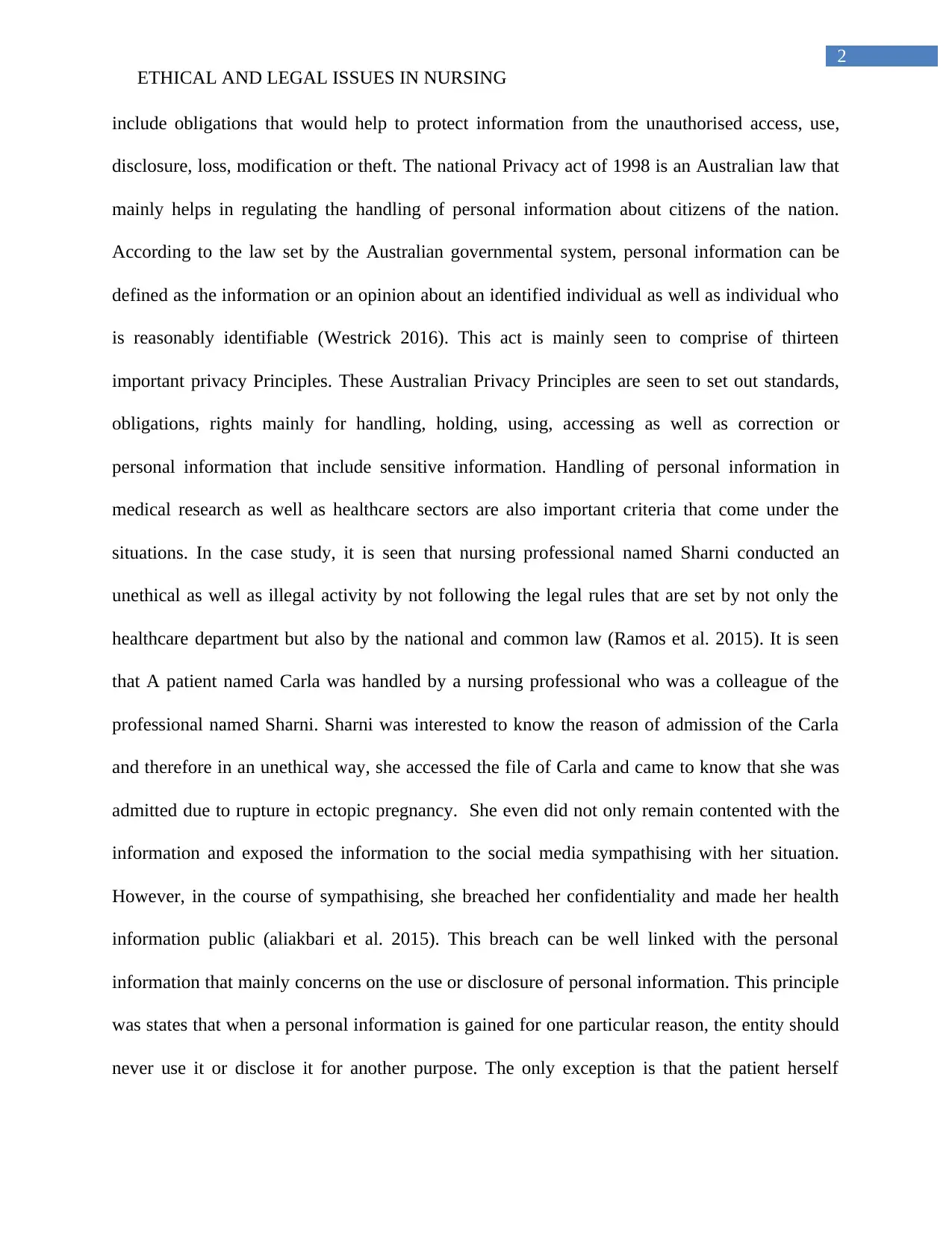
2
ETHICAL AND LEGAL ISSUES IN NURSING
include obligations that would help to protect information from the unauthorised access, use,
disclosure, loss, modification or theft. The national Privacy act of 1998 is an Australian law that
mainly helps in regulating the handling of personal information about citizens of the nation.
According to the law set by the Australian governmental system, personal information can be
defined as the information or an opinion about an identified individual as well as individual who
is reasonably identifiable (Westrick 2016). This act is mainly seen to comprise of thirteen
important privacy Principles. These Australian Privacy Principles are seen to set out standards,
obligations, rights mainly for handling, holding, using, accessing as well as correction or
personal information that include sensitive information. Handling of personal information in
medical research as well as healthcare sectors are also important criteria that come under the
situations. In the case study, it is seen that nursing professional named Sharni conducted an
unethical as well as illegal activity by not following the legal rules that are set by not only the
healthcare department but also by the national and common law (Ramos et al. 2015). It is seen
that A patient named Carla was handled by a nursing professional who was a colleague of the
professional named Sharni. Sharni was interested to know the reason of admission of the Carla
and therefore in an unethical way, she accessed the file of Carla and came to know that she was
admitted due to rupture in ectopic pregnancy. She even did not only remain contented with the
information and exposed the information to the social media sympathising with her situation.
However, in the course of sympathising, she breached her confidentiality and made her health
information public (aliakbari et al. 2015). This breach can be well linked with the personal
information that mainly concerns on the use or disclosure of personal information. This principle
was states that when a personal information is gained for one particular reason, the entity should
never use it or disclose it for another purpose. The only exception is that the patient herself
ETHICAL AND LEGAL ISSUES IN NURSING
include obligations that would help to protect information from the unauthorised access, use,
disclosure, loss, modification or theft. The national Privacy act of 1998 is an Australian law that
mainly helps in regulating the handling of personal information about citizens of the nation.
According to the law set by the Australian governmental system, personal information can be
defined as the information or an opinion about an identified individual as well as individual who
is reasonably identifiable (Westrick 2016). This act is mainly seen to comprise of thirteen
important privacy Principles. These Australian Privacy Principles are seen to set out standards,
obligations, rights mainly for handling, holding, using, accessing as well as correction or
personal information that include sensitive information. Handling of personal information in
medical research as well as healthcare sectors are also important criteria that come under the
situations. In the case study, it is seen that nursing professional named Sharni conducted an
unethical as well as illegal activity by not following the legal rules that are set by not only the
healthcare department but also by the national and common law (Ramos et al. 2015). It is seen
that A patient named Carla was handled by a nursing professional who was a colleague of the
professional named Sharni. Sharni was interested to know the reason of admission of the Carla
and therefore in an unethical way, she accessed the file of Carla and came to know that she was
admitted due to rupture in ectopic pregnancy. She even did not only remain contented with the
information and exposed the information to the social media sympathising with her situation.
However, in the course of sympathising, she breached her confidentiality and made her health
information public (aliakbari et al. 2015). This breach can be well linked with the personal
information that mainly concerns on the use or disclosure of personal information. This principle
was states that when a personal information is gained for one particular reason, the entity should
never use it or disclose it for another purpose. The only exception is that the patient herself
⊘ This is a preview!⊘
Do you want full access?
Subscribe today to unlock all pages.

Trusted by 1+ million students worldwide
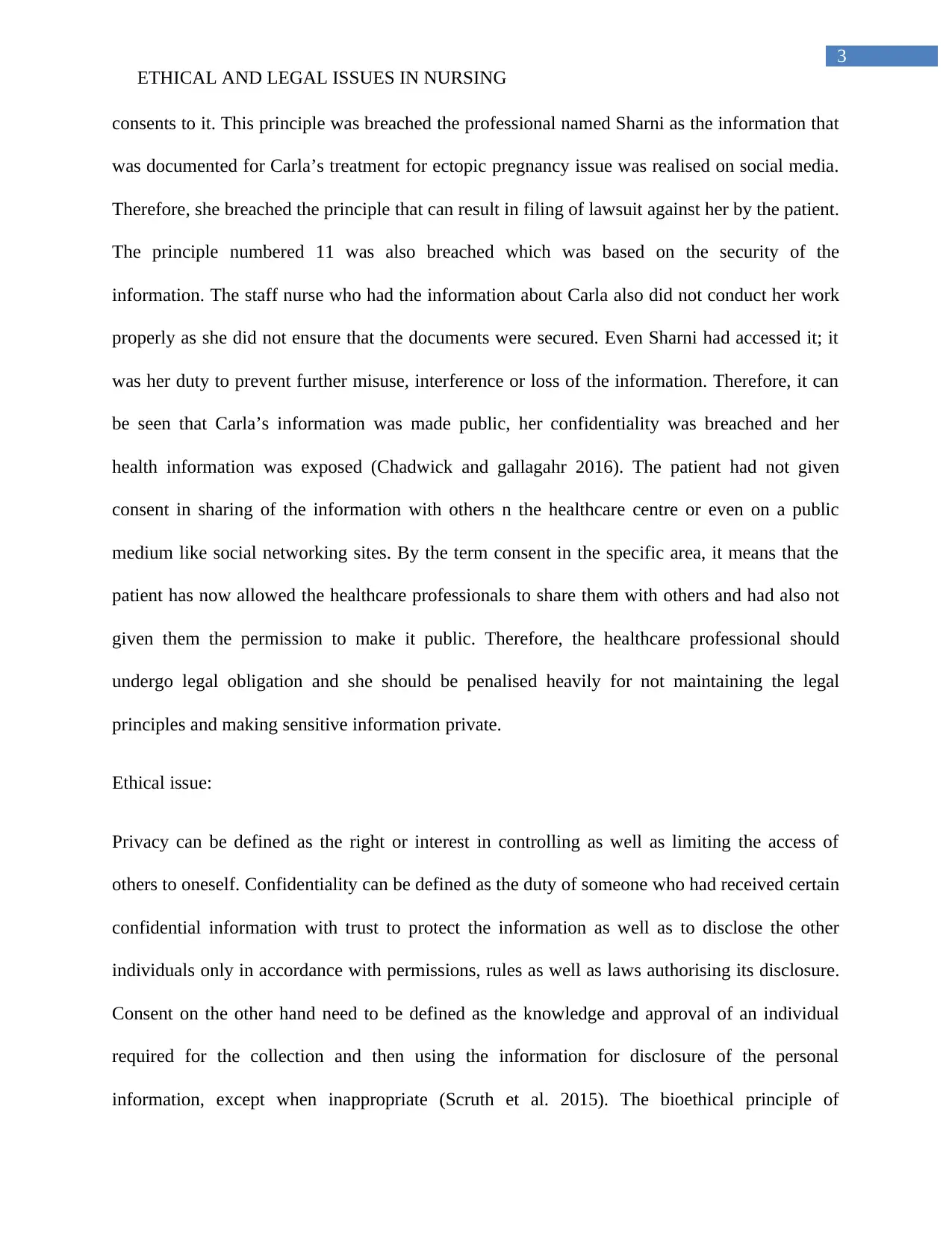
3
ETHICAL AND LEGAL ISSUES IN NURSING
consents to it. This principle was breached the professional named Sharni as the information that
was documented for Carla’s treatment for ectopic pregnancy issue was realised on social media.
Therefore, she breached the principle that can result in filing of lawsuit against her by the patient.
The principle numbered 11 was also breached which was based on the security of the
information. The staff nurse who had the information about Carla also did not conduct her work
properly as she did not ensure that the documents were secured. Even Sharni had accessed it; it
was her duty to prevent further misuse, interference or loss of the information. Therefore, it can
be seen that Carla’s information was made public, her confidentiality was breached and her
health information was exposed (Chadwick and gallagahr 2016). The patient had not given
consent in sharing of the information with others n the healthcare centre or even on a public
medium like social networking sites. By the term consent in the specific area, it means that the
patient has now allowed the healthcare professionals to share them with others and had also not
given them the permission to make it public. Therefore, the healthcare professional should
undergo legal obligation and she should be penalised heavily for not maintaining the legal
principles and making sensitive information private.
Ethical issue:
Privacy can be defined as the right or interest in controlling as well as limiting the access of
others to oneself. Confidentiality can be defined as the duty of someone who had received certain
confidential information with trust to protect the information as well as to disclose the other
individuals only in accordance with permissions, rules as well as laws authorising its disclosure.
Consent on the other hand need to be defined as the knowledge and approval of an individual
required for the collection and then using the information for disclosure of the personal
information, except when inappropriate (Scruth et al. 2015). The bioethical principle of
ETHICAL AND LEGAL ISSUES IN NURSING
consents to it. This principle was breached the professional named Sharni as the information that
was documented for Carla’s treatment for ectopic pregnancy issue was realised on social media.
Therefore, she breached the principle that can result in filing of lawsuit against her by the patient.
The principle numbered 11 was also breached which was based on the security of the
information. The staff nurse who had the information about Carla also did not conduct her work
properly as she did not ensure that the documents were secured. Even Sharni had accessed it; it
was her duty to prevent further misuse, interference or loss of the information. Therefore, it can
be seen that Carla’s information was made public, her confidentiality was breached and her
health information was exposed (Chadwick and gallagahr 2016). The patient had not given
consent in sharing of the information with others n the healthcare centre or even on a public
medium like social networking sites. By the term consent in the specific area, it means that the
patient has now allowed the healthcare professionals to share them with others and had also not
given them the permission to make it public. Therefore, the healthcare professional should
undergo legal obligation and she should be penalised heavily for not maintaining the legal
principles and making sensitive information private.
Ethical issue:
Privacy can be defined as the right or interest in controlling as well as limiting the access of
others to oneself. Confidentiality can be defined as the duty of someone who had received certain
confidential information with trust to protect the information as well as to disclose the other
individuals only in accordance with permissions, rules as well as laws authorising its disclosure.
Consent on the other hand need to be defined as the knowledge and approval of an individual
required for the collection and then using the information for disclosure of the personal
information, except when inappropriate (Scruth et al. 2015). The bioethical principle of
Paraphrase This Document
Need a fresh take? Get an instant paraphrase of this document with our AI Paraphraser
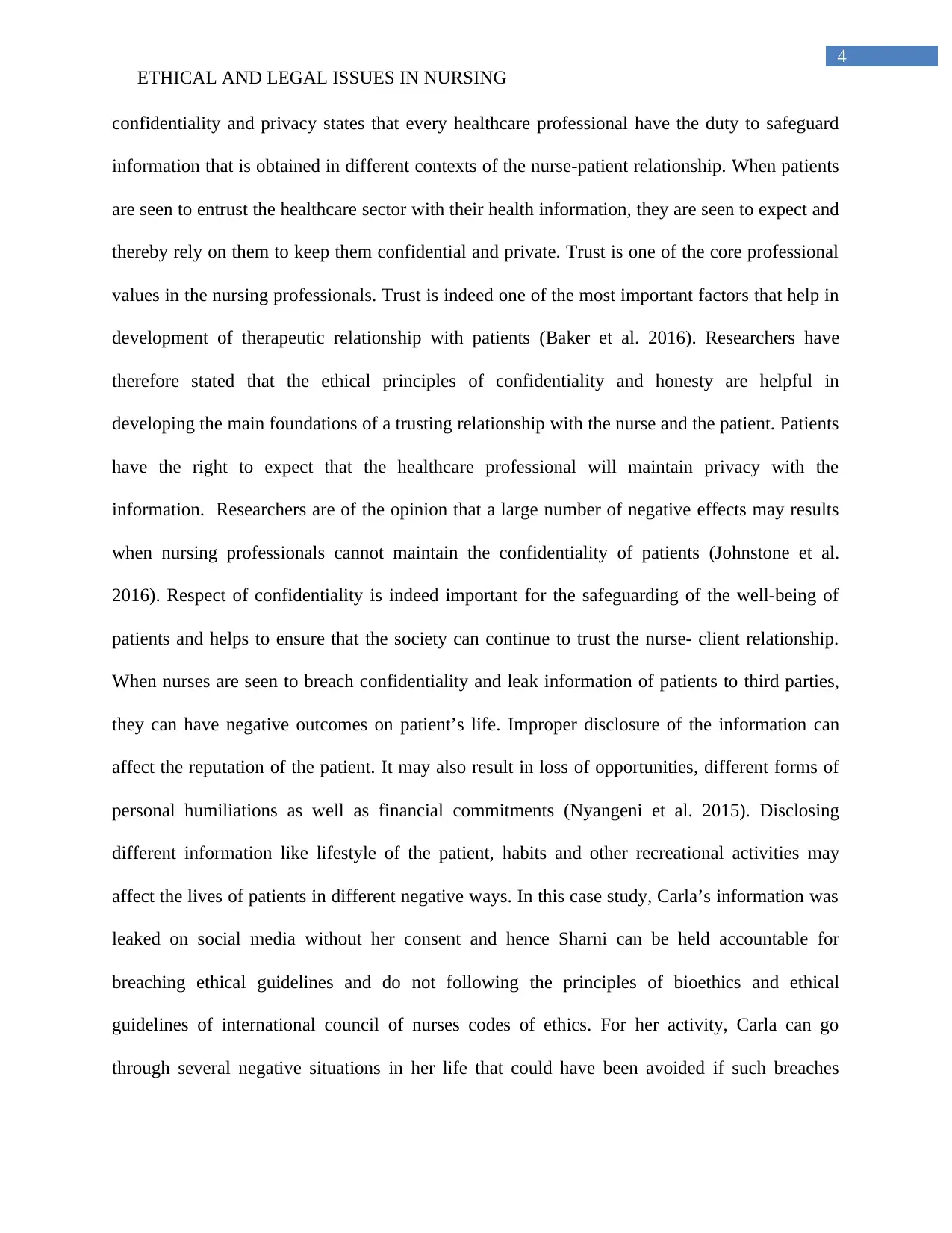
4
ETHICAL AND LEGAL ISSUES IN NURSING
confidentiality and privacy states that every healthcare professional have the duty to safeguard
information that is obtained in different contexts of the nurse-patient relationship. When patients
are seen to entrust the healthcare sector with their health information, they are seen to expect and
thereby rely on them to keep them confidential and private. Trust is one of the core professional
values in the nursing professionals. Trust is indeed one of the most important factors that help in
development of therapeutic relationship with patients (Baker et al. 2016). Researchers have
therefore stated that the ethical principles of confidentiality and honesty are helpful in
developing the main foundations of a trusting relationship with the nurse and the patient. Patients
have the right to expect that the healthcare professional will maintain privacy with the
information. Researchers are of the opinion that a large number of negative effects may results
when nursing professionals cannot maintain the confidentiality of patients (Johnstone et al.
2016). Respect of confidentiality is indeed important for the safeguarding of the well-being of
patients and helps to ensure that the society can continue to trust the nurse- client relationship.
When nurses are seen to breach confidentiality and leak information of patients to third parties,
they can have negative outcomes on patient’s life. Improper disclosure of the information can
affect the reputation of the patient. It may also result in loss of opportunities, different forms of
personal humiliations as well as financial commitments (Nyangeni et al. 2015). Disclosing
different information like lifestyle of the patient, habits and other recreational activities may
affect the lives of patients in different negative ways. In this case study, Carla’s information was
leaked on social media without her consent and hence Sharni can be held accountable for
breaching ethical guidelines and do not following the principles of bioethics and ethical
guidelines of international council of nurses codes of ethics. For her activity, Carla can go
through several negative situations in her life that could have been avoided if such breaches
ETHICAL AND LEGAL ISSUES IN NURSING
confidentiality and privacy states that every healthcare professional have the duty to safeguard
information that is obtained in different contexts of the nurse-patient relationship. When patients
are seen to entrust the healthcare sector with their health information, they are seen to expect and
thereby rely on them to keep them confidential and private. Trust is one of the core professional
values in the nursing professionals. Trust is indeed one of the most important factors that help in
development of therapeutic relationship with patients (Baker et al. 2016). Researchers have
therefore stated that the ethical principles of confidentiality and honesty are helpful in
developing the main foundations of a trusting relationship with the nurse and the patient. Patients
have the right to expect that the healthcare professional will maintain privacy with the
information. Researchers are of the opinion that a large number of negative effects may results
when nursing professionals cannot maintain the confidentiality of patients (Johnstone et al.
2016). Respect of confidentiality is indeed important for the safeguarding of the well-being of
patients and helps to ensure that the society can continue to trust the nurse- client relationship.
When nurses are seen to breach confidentiality and leak information of patients to third parties,
they can have negative outcomes on patient’s life. Improper disclosure of the information can
affect the reputation of the patient. It may also result in loss of opportunities, different forms of
personal humiliations as well as financial commitments (Nyangeni et al. 2015). Disclosing
different information like lifestyle of the patient, habits and other recreational activities may
affect the lives of patients in different negative ways. In this case study, Carla’s information was
leaked on social media without her consent and hence Sharni can be held accountable for
breaching ethical guidelines and do not following the principles of bioethics and ethical
guidelines of international council of nurses codes of ethics. For her activity, Carla can go
through several negative situations in her life that could have been avoided if such breaches
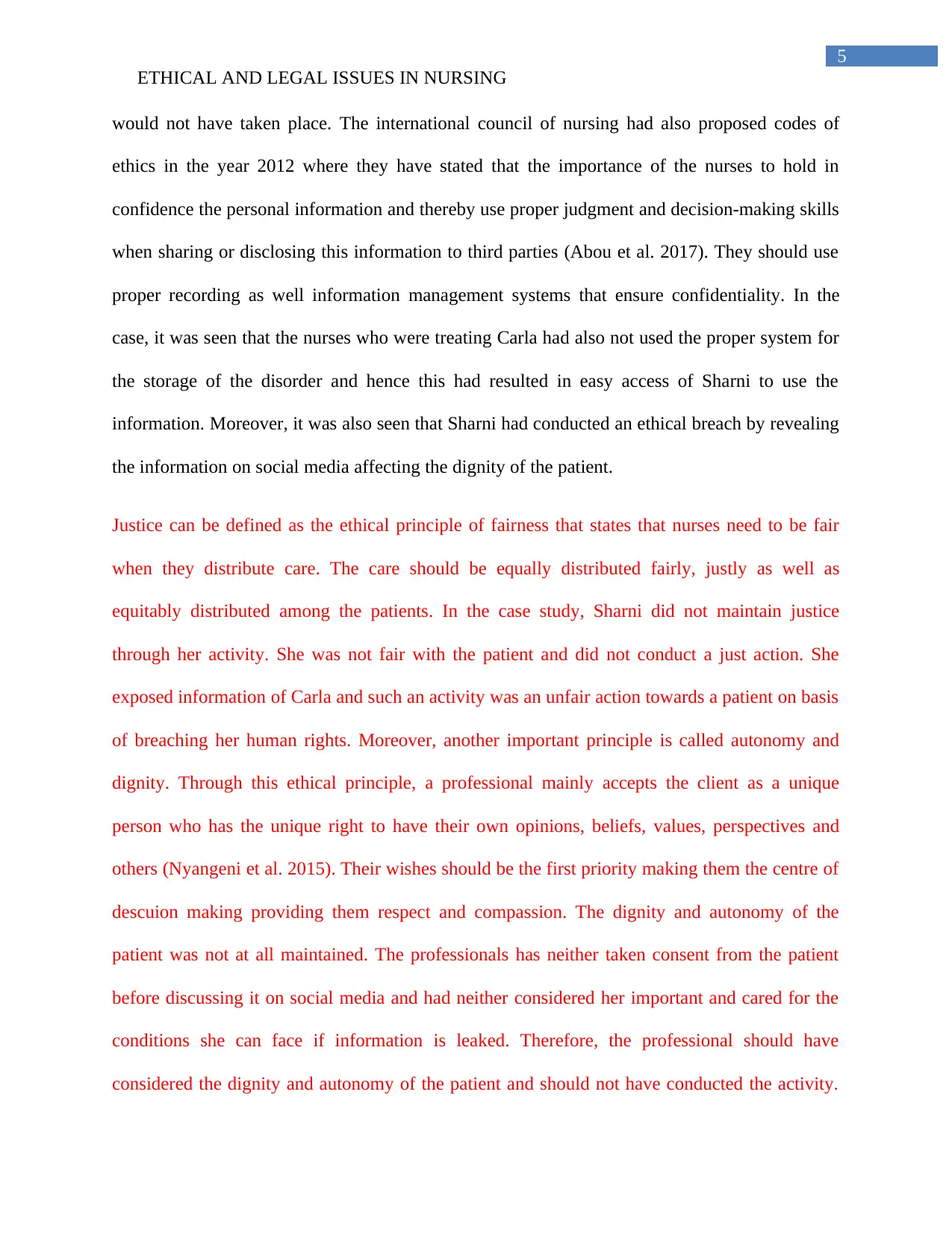
5
ETHICAL AND LEGAL ISSUES IN NURSING
would not have taken place. The international council of nursing had also proposed codes of
ethics in the year 2012 where they have stated that the importance of the nurses to hold in
confidence the personal information and thereby use proper judgment and decision-making skills
when sharing or disclosing this information to third parties (Abou et al. 2017). They should use
proper recording as well information management systems that ensure confidentiality. In the
case, it was seen that the nurses who were treating Carla had also not used the proper system for
the storage of the disorder and hence this had resulted in easy access of Sharni to use the
information. Moreover, it was also seen that Sharni had conducted an ethical breach by revealing
the information on social media affecting the dignity of the patient.
Justice can be defined as the ethical principle of fairness that states that nurses need to be fair
when they distribute care. The care should be equally distributed fairly, justly as well as
equitably distributed among the patients. In the case study, Sharni did not maintain justice
through her activity. She was not fair with the patient and did not conduct a just action. She
exposed information of Carla and such an activity was an unfair action towards a patient on basis
of breaching her human rights. Moreover, another important principle is called autonomy and
dignity. Through this ethical principle, a professional mainly accepts the client as a unique
person who has the unique right to have their own opinions, beliefs, values, perspectives and
others (Nyangeni et al. 2015). Their wishes should be the first priority making them the centre of
descuion making providing them respect and compassion. The dignity and autonomy of the
patient was not at all maintained. The professionals has neither taken consent from the patient
before discussing it on social media and had neither considered her important and cared for the
conditions she can face if information is leaked. Therefore, the professional should have
considered the dignity and autonomy of the patient and should not have conducted the activity.
ETHICAL AND LEGAL ISSUES IN NURSING
would not have taken place. The international council of nursing had also proposed codes of
ethics in the year 2012 where they have stated that the importance of the nurses to hold in
confidence the personal information and thereby use proper judgment and decision-making skills
when sharing or disclosing this information to third parties (Abou et al. 2017). They should use
proper recording as well information management systems that ensure confidentiality. In the
case, it was seen that the nurses who were treating Carla had also not used the proper system for
the storage of the disorder and hence this had resulted in easy access of Sharni to use the
information. Moreover, it was also seen that Sharni had conducted an ethical breach by revealing
the information on social media affecting the dignity of the patient.
Justice can be defined as the ethical principle of fairness that states that nurses need to be fair
when they distribute care. The care should be equally distributed fairly, justly as well as
equitably distributed among the patients. In the case study, Sharni did not maintain justice
through her activity. She was not fair with the patient and did not conduct a just action. She
exposed information of Carla and such an activity was an unfair action towards a patient on basis
of breaching her human rights. Moreover, another important principle is called autonomy and
dignity. Through this ethical principle, a professional mainly accepts the client as a unique
person who has the unique right to have their own opinions, beliefs, values, perspectives and
others (Nyangeni et al. 2015). Their wishes should be the first priority making them the centre of
descuion making providing them respect and compassion. The dignity and autonomy of the
patient was not at all maintained. The professionals has neither taken consent from the patient
before discussing it on social media and had neither considered her important and cared for the
conditions she can face if information is leaked. Therefore, the professional should have
considered the dignity and autonomy of the patient and should not have conducted the activity.
⊘ This is a preview!⊘
Do you want full access?
Subscribe today to unlock all pages.

Trusted by 1+ million students worldwide
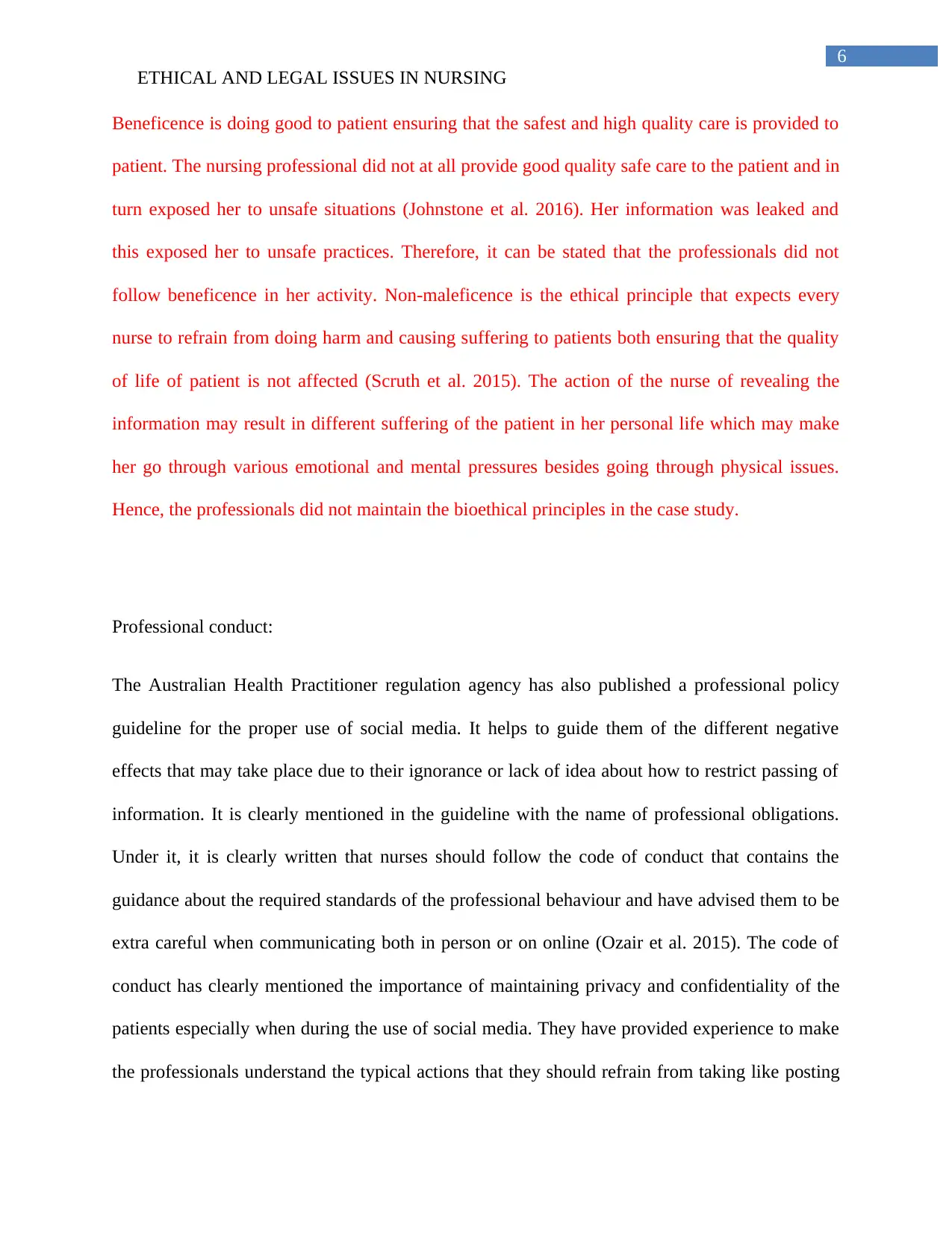
6
ETHICAL AND LEGAL ISSUES IN NURSING
Beneficence is doing good to patient ensuring that the safest and high quality care is provided to
patient. The nursing professional did not at all provide good quality safe care to the patient and in
turn exposed her to unsafe situations (Johnstone et al. 2016). Her information was leaked and
this exposed her to unsafe practices. Therefore, it can be stated that the professionals did not
follow beneficence in her activity. Non-maleficence is the ethical principle that expects every
nurse to refrain from doing harm and causing suffering to patients both ensuring that the quality
of life of patient is not affected (Scruth et al. 2015). The action of the nurse of revealing the
information may result in different suffering of the patient in her personal life which may make
her go through various emotional and mental pressures besides going through physical issues.
Hence, the professionals did not maintain the bioethical principles in the case study.
Professional conduct:
The Australian Health Practitioner regulation agency has also published a professional policy
guideline for the proper use of social media. It helps to guide them of the different negative
effects that may take place due to their ignorance or lack of idea about how to restrict passing of
information. It is clearly mentioned in the guideline with the name of professional obligations.
Under it, it is clearly written that nurses should follow the code of conduct that contains the
guidance about the required standards of the professional behaviour and have advised them to be
extra careful when communicating both in person or on online (Ozair et al. 2015). The code of
conduct has clearly mentioned the importance of maintaining privacy and confidentiality of the
patients especially when during the use of social media. They have provided experience to make
the professionals understand the typical actions that they should refrain from taking like posting
ETHICAL AND LEGAL ISSUES IN NURSING
Beneficence is doing good to patient ensuring that the safest and high quality care is provided to
patient. The nursing professional did not at all provide good quality safe care to the patient and in
turn exposed her to unsafe situations (Johnstone et al. 2016). Her information was leaked and
this exposed her to unsafe practices. Therefore, it can be stated that the professionals did not
follow beneficence in her activity. Non-maleficence is the ethical principle that expects every
nurse to refrain from doing harm and causing suffering to patients both ensuring that the quality
of life of patient is not affected (Scruth et al. 2015). The action of the nurse of revealing the
information may result in different suffering of the patient in her personal life which may make
her go through various emotional and mental pressures besides going through physical issues.
Hence, the professionals did not maintain the bioethical principles in the case study.
Professional conduct:
The Australian Health Practitioner regulation agency has also published a professional policy
guideline for the proper use of social media. It helps to guide them of the different negative
effects that may take place due to their ignorance or lack of idea about how to restrict passing of
information. It is clearly mentioned in the guideline with the name of professional obligations.
Under it, it is clearly written that nurses should follow the code of conduct that contains the
guidance about the required standards of the professional behaviour and have advised them to be
extra careful when communicating both in person or on online (Ozair et al. 2015). The code of
conduct has clearly mentioned the importance of maintaining privacy and confidentiality of the
patients especially when during the use of social media. They have provided experience to make
the professionals understand the typical actions that they should refrain from taking like posting
Paraphrase This Document
Need a fresh take? Get an instant paraphrase of this document with our AI Paraphraser
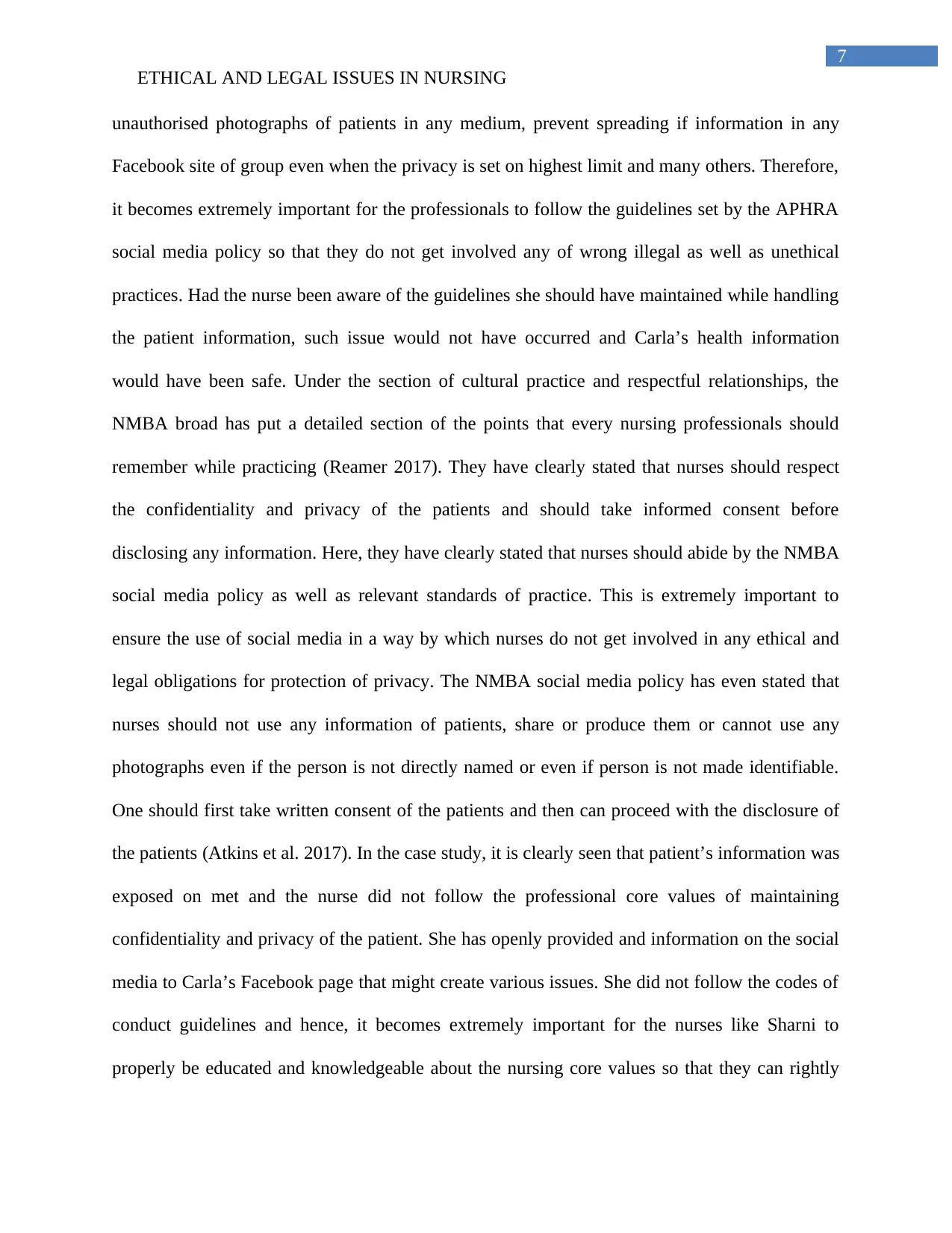
7
ETHICAL AND LEGAL ISSUES IN NURSING
unauthorised photographs of patients in any medium, prevent spreading if information in any
Facebook site of group even when the privacy is set on highest limit and many others. Therefore,
it becomes extremely important for the professionals to follow the guidelines set by the APHRA
social media policy so that they do not get involved any of wrong illegal as well as unethical
practices. Had the nurse been aware of the guidelines she should have maintained while handling
the patient information, such issue would not have occurred and Carla’s health information
would have been safe. Under the section of cultural practice and respectful relationships, the
NMBA broad has put a detailed section of the points that every nursing professionals should
remember while practicing (Reamer 2017). They have clearly stated that nurses should respect
the confidentiality and privacy of the patients and should take informed consent before
disclosing any information. Here, they have clearly stated that nurses should abide by the NMBA
social media policy as well as relevant standards of practice. This is extremely important to
ensure the use of social media in a way by which nurses do not get involved in any ethical and
legal obligations for protection of privacy. The NMBA social media policy has even stated that
nurses should not use any information of patients, share or produce them or cannot use any
photographs even if the person is not directly named or even if person is not made identifiable.
One should first take written consent of the patients and then can proceed with the disclosure of
the patients (Atkins et al. 2017). In the case study, it is clearly seen that patient’s information was
exposed on met and the nurse did not follow the professional core values of maintaining
confidentiality and privacy of the patient. She has openly provided and information on the social
media to Carla’s Facebook page that might create various issues. She did not follow the codes of
conduct guidelines and hence, it becomes extremely important for the nurses like Sharni to
properly be educated and knowledgeable about the nursing core values so that they can rightly
ETHICAL AND LEGAL ISSUES IN NURSING
unauthorised photographs of patients in any medium, prevent spreading if information in any
Facebook site of group even when the privacy is set on highest limit and many others. Therefore,
it becomes extremely important for the professionals to follow the guidelines set by the APHRA
social media policy so that they do not get involved any of wrong illegal as well as unethical
practices. Had the nurse been aware of the guidelines she should have maintained while handling
the patient information, such issue would not have occurred and Carla’s health information
would have been safe. Under the section of cultural practice and respectful relationships, the
NMBA broad has put a detailed section of the points that every nursing professionals should
remember while practicing (Reamer 2017). They have clearly stated that nurses should respect
the confidentiality and privacy of the patients and should take informed consent before
disclosing any information. Here, they have clearly stated that nurses should abide by the NMBA
social media policy as well as relevant standards of practice. This is extremely important to
ensure the use of social media in a way by which nurses do not get involved in any ethical and
legal obligations for protection of privacy. The NMBA social media policy has even stated that
nurses should not use any information of patients, share or produce them or cannot use any
photographs even if the person is not directly named or even if person is not made identifiable.
One should first take written consent of the patients and then can proceed with the disclosure of
the patients (Atkins et al. 2017). In the case study, it is clearly seen that patient’s information was
exposed on met and the nurse did not follow the professional core values of maintaining
confidentiality and privacy of the patient. She has openly provided and information on the social
media to Carla’s Facebook page that might create various issues. She did not follow the codes of
conduct guidelines and hence, it becomes extremely important for the nurses like Sharni to
properly be educated and knowledgeable about the nursing core values so that they can rightly
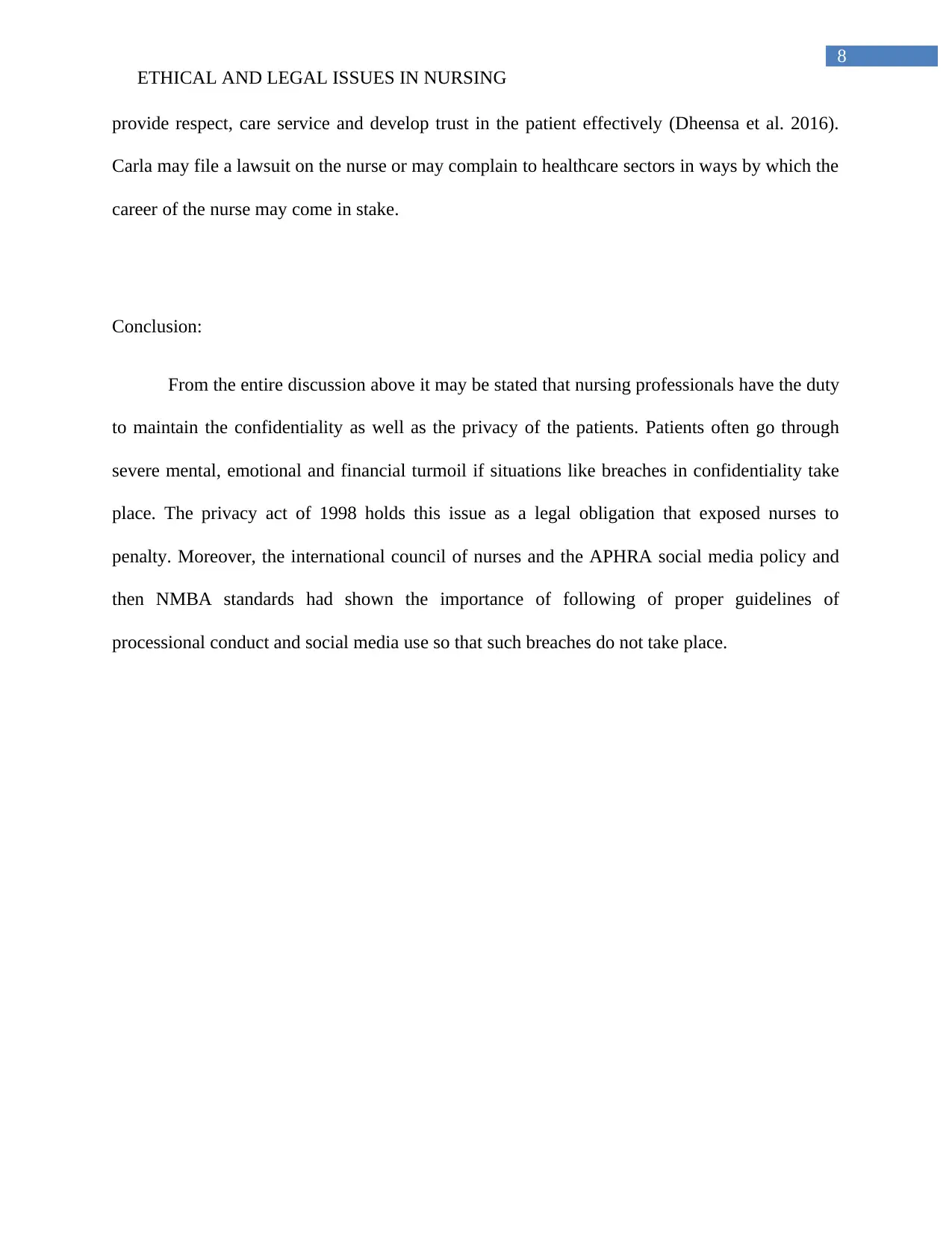
8
ETHICAL AND LEGAL ISSUES IN NURSING
provide respect, care service and develop trust in the patient effectively (Dheensa et al. 2016).
Carla may file a lawsuit on the nurse or may complain to healthcare sectors in ways by which the
career of the nurse may come in stake.
Conclusion:
From the entire discussion above it may be stated that nursing professionals have the duty
to maintain the confidentiality as well as the privacy of the patients. Patients often go through
severe mental, emotional and financial turmoil if situations like breaches in confidentiality take
place. The privacy act of 1998 holds this issue as a legal obligation that exposed nurses to
penalty. Moreover, the international council of nurses and the APHRA social media policy and
then NMBA standards had shown the importance of following of proper guidelines of
processional conduct and social media use so that such breaches do not take place.
ETHICAL AND LEGAL ISSUES IN NURSING
provide respect, care service and develop trust in the patient effectively (Dheensa et al. 2016).
Carla may file a lawsuit on the nurse or may complain to healthcare sectors in ways by which the
career of the nurse may come in stake.
Conclusion:
From the entire discussion above it may be stated that nursing professionals have the duty
to maintain the confidentiality as well as the privacy of the patients. Patients often go through
severe mental, emotional and financial turmoil if situations like breaches in confidentiality take
place. The privacy act of 1998 holds this issue as a legal obligation that exposed nurses to
penalty. Moreover, the international council of nurses and the APHRA social media policy and
then NMBA standards had shown the importance of following of proper guidelines of
processional conduct and social media use so that such breaches do not take place.
⊘ This is a preview!⊘
Do you want full access?
Subscribe today to unlock all pages.

Trusted by 1+ million students worldwide
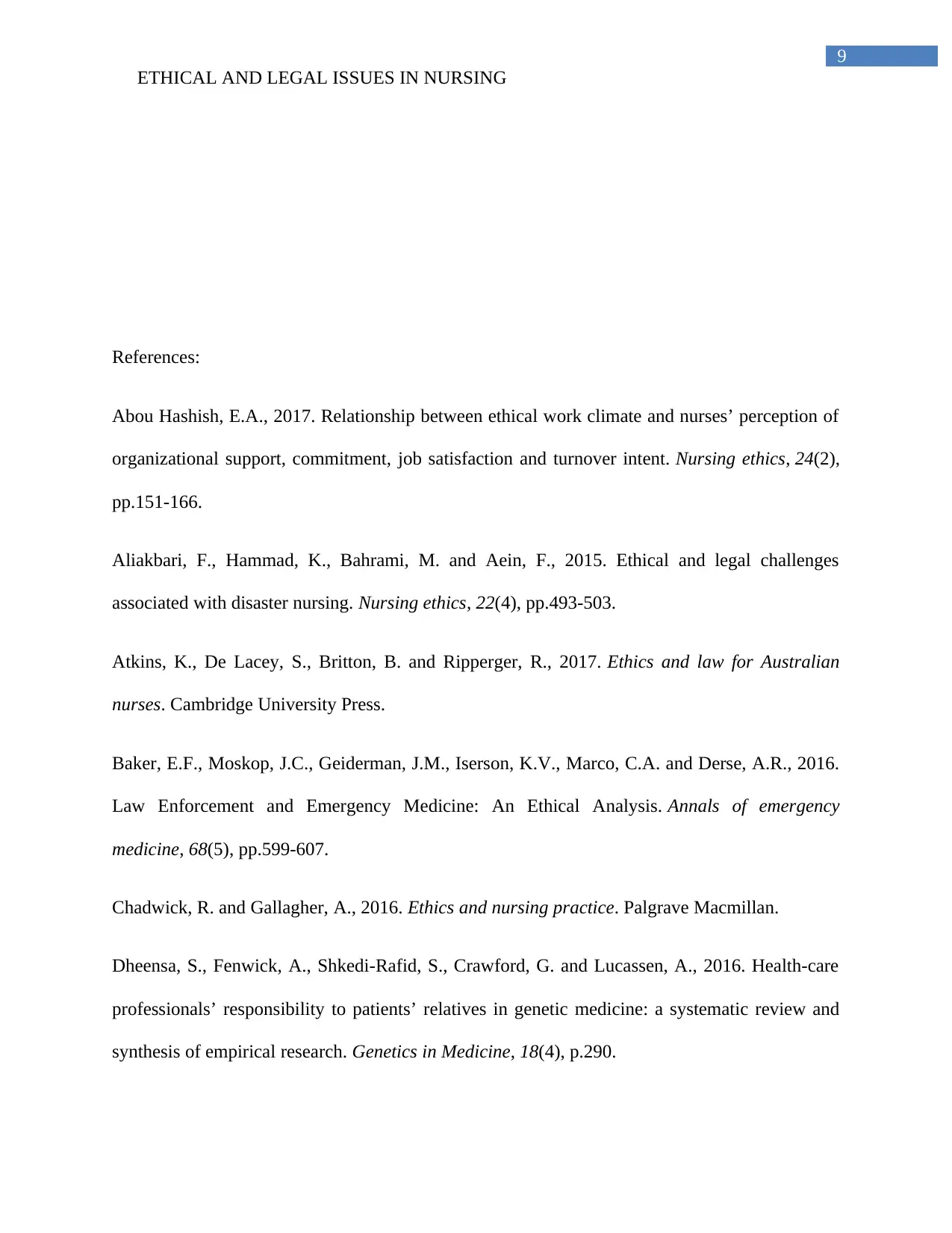
9
ETHICAL AND LEGAL ISSUES IN NURSING
References:
Abou Hashish, E.A., 2017. Relationship between ethical work climate and nurses’ perception of
organizational support, commitment, job satisfaction and turnover intent. Nursing ethics, 24(2),
pp.151-166.
Aliakbari, F., Hammad, K., Bahrami, M. and Aein, F., 2015. Ethical and legal challenges
associated with disaster nursing. Nursing ethics, 22(4), pp.493-503.
Atkins, K., De Lacey, S., Britton, B. and Ripperger, R., 2017. Ethics and law for Australian
nurses. Cambridge University Press.
Baker, E.F., Moskop, J.C., Geiderman, J.M., Iserson, K.V., Marco, C.A. and Derse, A.R., 2016.
Law Enforcement and Emergency Medicine: An Ethical Analysis. Annals of emergency
medicine, 68(5), pp.599-607.
Chadwick, R. and Gallagher, A., 2016. Ethics and nursing practice. Palgrave Macmillan.
Dheensa, S., Fenwick, A., Shkedi-Rafid, S., Crawford, G. and Lucassen, A., 2016. Health-care
professionals’ responsibility to patients’ relatives in genetic medicine: a systematic review and
synthesis of empirical research. Genetics in Medicine, 18(4), p.290.
ETHICAL AND LEGAL ISSUES IN NURSING
References:
Abou Hashish, E.A., 2017. Relationship between ethical work climate and nurses’ perception of
organizational support, commitment, job satisfaction and turnover intent. Nursing ethics, 24(2),
pp.151-166.
Aliakbari, F., Hammad, K., Bahrami, M. and Aein, F., 2015. Ethical and legal challenges
associated with disaster nursing. Nursing ethics, 22(4), pp.493-503.
Atkins, K., De Lacey, S., Britton, B. and Ripperger, R., 2017. Ethics and law for Australian
nurses. Cambridge University Press.
Baker, E.F., Moskop, J.C., Geiderman, J.M., Iserson, K.V., Marco, C.A. and Derse, A.R., 2016.
Law Enforcement and Emergency Medicine: An Ethical Analysis. Annals of emergency
medicine, 68(5), pp.599-607.
Chadwick, R. and Gallagher, A., 2016. Ethics and nursing practice. Palgrave Macmillan.
Dheensa, S., Fenwick, A., Shkedi-Rafid, S., Crawford, G. and Lucassen, A., 2016. Health-care
professionals’ responsibility to patients’ relatives in genetic medicine: a systematic review and
synthesis of empirical research. Genetics in Medicine, 18(4), p.290.
Paraphrase This Document
Need a fresh take? Get an instant paraphrase of this document with our AI Paraphraser
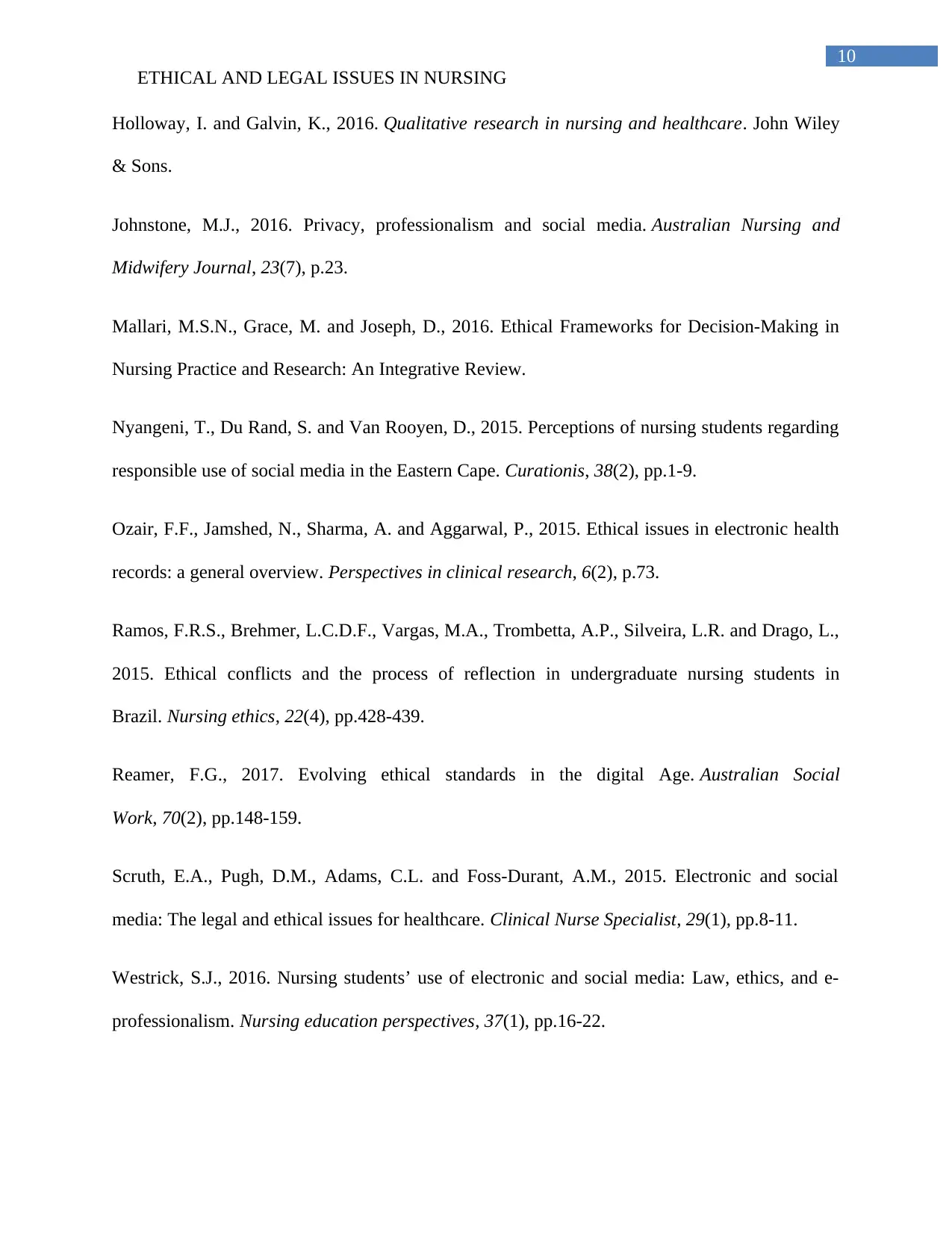
10
ETHICAL AND LEGAL ISSUES IN NURSING
Holloway, I. and Galvin, K., 2016. Qualitative research in nursing and healthcare. John Wiley
& Sons.
Johnstone, M.J., 2016. Privacy, professionalism and social media. Australian Nursing and
Midwifery Journal, 23(7), p.23.
Mallari, M.S.N., Grace, M. and Joseph, D., 2016. Ethical Frameworks for Decision-Making in
Nursing Practice and Research: An Integrative Review.
Nyangeni, T., Du Rand, S. and Van Rooyen, D., 2015. Perceptions of nursing students regarding
responsible use of social media in the Eastern Cape. Curationis, 38(2), pp.1-9.
Ozair, F.F., Jamshed, N., Sharma, A. and Aggarwal, P., 2015. Ethical issues in electronic health
records: a general overview. Perspectives in clinical research, 6(2), p.73.
Ramos, F.R.S., Brehmer, L.C.D.F., Vargas, M.A., Trombetta, A.P., Silveira, L.R. and Drago, L.,
2015. Ethical conflicts and the process of reflection in undergraduate nursing students in
Brazil. Nursing ethics, 22(4), pp.428-439.
Reamer, F.G., 2017. Evolving ethical standards in the digital Age. Australian Social
Work, 70(2), pp.148-159.
Scruth, E.A., Pugh, D.M., Adams, C.L. and Foss-Durant, A.M., 2015. Electronic and social
media: The legal and ethical issues for healthcare. Clinical Nurse Specialist, 29(1), pp.8-11.
Westrick, S.J., 2016. Nursing students’ use of electronic and social media: Law, ethics, and e-
professionalism. Nursing education perspectives, 37(1), pp.16-22.
ETHICAL AND LEGAL ISSUES IN NURSING
Holloway, I. and Galvin, K., 2016. Qualitative research in nursing and healthcare. John Wiley
& Sons.
Johnstone, M.J., 2016. Privacy, professionalism and social media. Australian Nursing and
Midwifery Journal, 23(7), p.23.
Mallari, M.S.N., Grace, M. and Joseph, D., 2016. Ethical Frameworks for Decision-Making in
Nursing Practice and Research: An Integrative Review.
Nyangeni, T., Du Rand, S. and Van Rooyen, D., 2015. Perceptions of nursing students regarding
responsible use of social media in the Eastern Cape. Curationis, 38(2), pp.1-9.
Ozair, F.F., Jamshed, N., Sharma, A. and Aggarwal, P., 2015. Ethical issues in electronic health
records: a general overview. Perspectives in clinical research, 6(2), p.73.
Ramos, F.R.S., Brehmer, L.C.D.F., Vargas, M.A., Trombetta, A.P., Silveira, L.R. and Drago, L.,
2015. Ethical conflicts and the process of reflection in undergraduate nursing students in
Brazil. Nursing ethics, 22(4), pp.428-439.
Reamer, F.G., 2017. Evolving ethical standards in the digital Age. Australian Social
Work, 70(2), pp.148-159.
Scruth, E.A., Pugh, D.M., Adams, C.L. and Foss-Durant, A.M., 2015. Electronic and social
media: The legal and ethical issues for healthcare. Clinical Nurse Specialist, 29(1), pp.8-11.
Westrick, S.J., 2016. Nursing students’ use of electronic and social media: Law, ethics, and e-
professionalism. Nursing education perspectives, 37(1), pp.16-22.
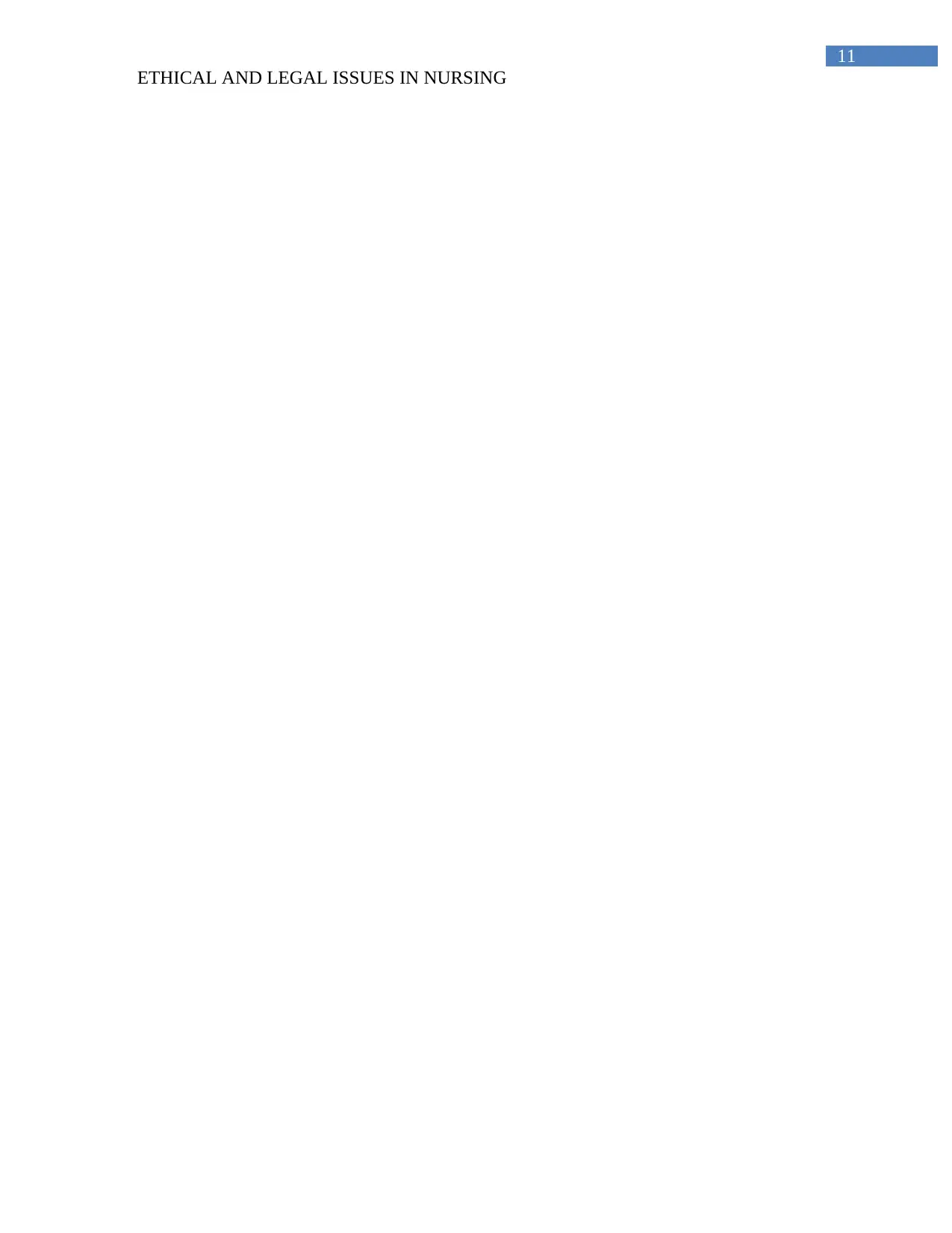
11
ETHICAL AND LEGAL ISSUES IN NURSING
ETHICAL AND LEGAL ISSUES IN NURSING
⊘ This is a preview!⊘
Do you want full access?
Subscribe today to unlock all pages.

Trusted by 1+ million students worldwide
1 out of 12
Related Documents
Your All-in-One AI-Powered Toolkit for Academic Success.
+13062052269
info@desklib.com
Available 24*7 on WhatsApp / Email
![[object Object]](/_next/static/media/star-bottom.7253800d.svg)
Unlock your academic potential
Copyright © 2020–2025 A2Z Services. All Rights Reserved. Developed and managed by ZUCOL.





